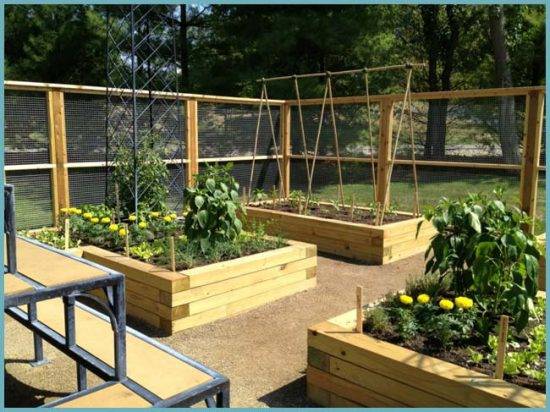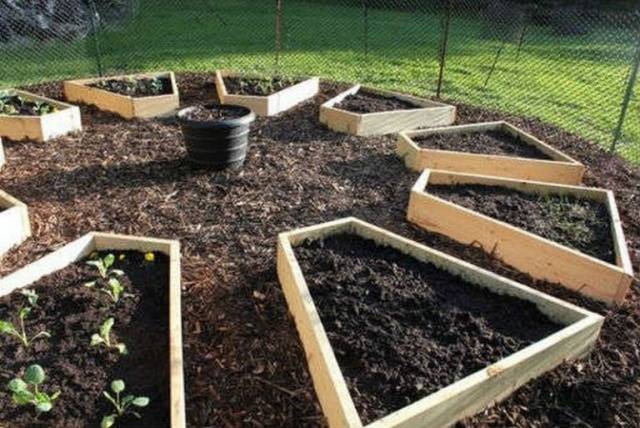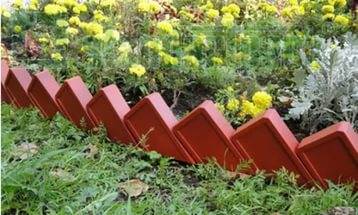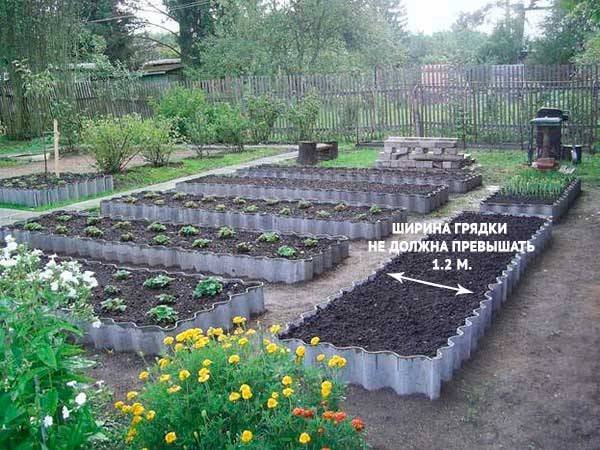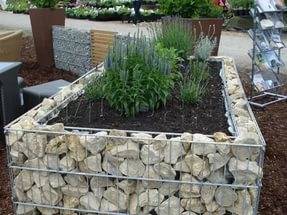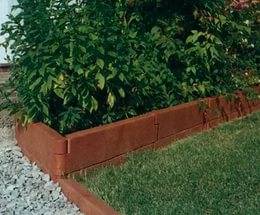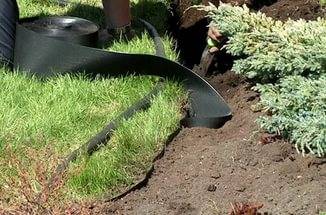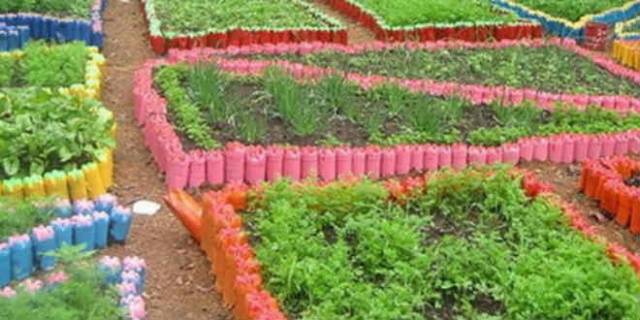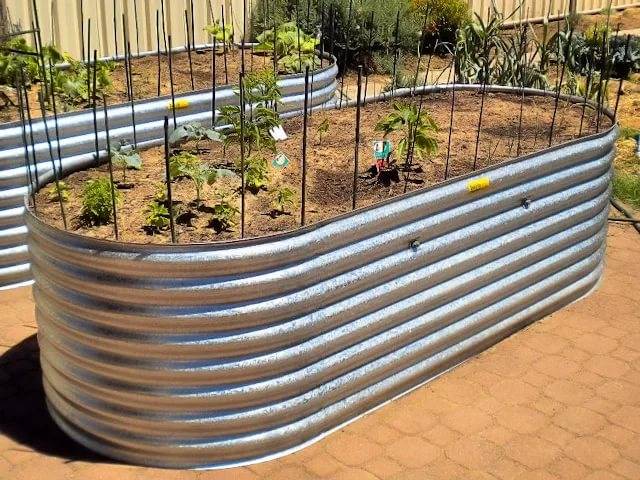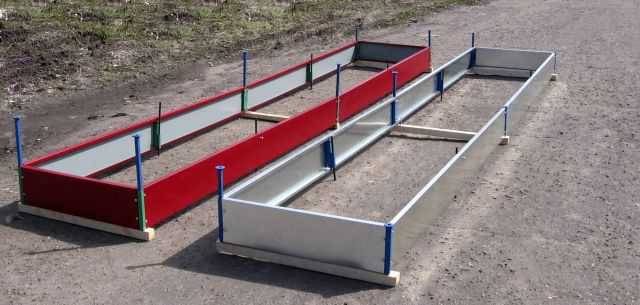Content
In many summer cottages, there are beds framed by borders. Such a fence is not always built to decorate the landscape. The reason for installing the curb may be the technology used for growing vegetables "warm bed" or loose soil. For the manufacture of the fence, any building material available on the farm is used. Now we will look at the photo of the beds with our own hands from scrap materials, and also find out how they can be made.
Why do they fence the beds in the garden?
The border decoration of the beds is, first of all, order in the garden. It's nice to go to your site, where vegetables grow in even rows, between them there is a path that is not overgrown with grass. In such beds, it is convenient to care for plants and harvest.
Let's find out what else they are intended for borders for flower beds:
- The sides prevent soil erosion during prolonged rains and heavy irrigation. The entire fertile layer remains under the plants, and does not flow down onto the paths.
- Lovers of growing early vegetables use the "warm bed" technology. It turns out a small spring greenhouse, capable of replacing a greenhouse in functionality. To make a garden bed, you will need to arrange high sides, lay organic matter, compost and sod in layers. Use a "warm bed" without shelter or put arcs, and stretch the film on top.
- The sides buried deep in the ground prevent the spread of perennial weeds in the garden. First, the usable area where the weed can grow is reduced. Instead of row spacings, paths are formed, and any grass that appears is quickly trampled underfoot. Secondly, the roots of creeping grasses cannot penetrate from the side into the garden bed due to the deeply dug in the fence.
You can arrange a garden bed of any shape and size with a fence, but the following sizes are considered optimal:
- Wide areas are not very convenient to handle. In order not to trample the ground and to reach each row of plants from the path, it is optimal to maintain a bed width of 800–900 mm.
- There are no restrictions on the length. Each gardener is content with his own preferences. Usually, the length of the beds is determined taking into account the total size of the land plot. It should be noted that beds longer than 6 m are difficult to water.
- It is impractical to make the height of the fence more than 100–150 mm. An exception may be "warm beds".
In general, each gardener determines the dimensions of the beds at his own discretion, so that it is convenient to look after them.
We make garden fences from everything that is at hand
To the fence beds on the site you can be creative, then the owner is not in danger of additional waste. In many summer cottages, some materials remained after construction. Don't throw them away. Even from the fragments of slate, it will turn out to build beautiful sides.
Wooden fences
This environmentally friendly material has huge pros and cons in the arrangement of garden fences. The positive side is the usefulness of wood. First, natural material does not poison the soil with harmful substances. Secondly, the slow decay of the wood provides the plants with additional fertilizer.
Now let's find out about the disadvantages. They consist in the same decay of wood. Such a fencing of the beds is short-lived. Usually, wooden sides are enough for 3-5 years. Wood rots quickly in the ground and this cannot be dealt with in any way. Some gardeners are trying to extend the life of the curb by painting, impregnating with an antiseptic, and even bitumen. However, such measures are temporary, and after a certain interval, rotted holes will appear in the fences, through which the soil will begin to pour out.
How to make wooden fences? It's very simple. If these are boards, then a rectangular box is knocked down from them. Pieces of picket fence, pieces of round timber and other remnants of wooden blanks are simply dug vertically into the ground around the beds. So that the elements do not disperse, they can be sewn with crossbars from any slats.
Brick fences
Brick fencing has been known since Soviet times. Then it was fashionable to fence flower beds, because the material was cheap. Now the brick fence will cost a pretty penny for the owner of the dacha. Even if the remnants of bricks from building a house are piled behind the house, you need to weigh where it is better to use it: for fencing a garden bed or erecting a farm building.
Brick does not contaminate the soil, so there is no need to worry about the condition of the plants. However, one must be prepared that the brick side is also immortal. Silicate brick in the ground is saturated with water, and with the onset of frost it gradually cracks, falling apart into pieces. Red brick is made of baked clay. If the manufacturing technology of the material was not followed, after a few years heaps of red clay will remain in the place of the curb.
In any case, a brick fence will last at least 10 years. For its manufacture, the blocks are driven into the ground with their butt ends under a slight slope so that teeth are formed on top.
Slate fencing
As an improvised means of asbestos-cement slate is an excellent find for making garden fences. Wavy and flat sheets are used. The slate is cut with a grinder into strips of the required width, after which they are dug into the ground.
Flat slate at the corners of the garden bed fence is connected with metal corners and bolts. For beauty, the borders can be painted in any color.
Slate fencing will last for many years, but we must remember that this material is fragile and afraid of impacts. After prolonged rains, shallowly dug sheets are sometimes squeezed out by the soil, which requires correcting the situation by reinstalling some fragments. It must be remembered that asbestos is part of the slate, which has a detrimental effect on the soil. Sometimes gardeners process the inside of the slate fence with bitumen or simply paint it.
Stone fence
Natural stone is an environmentally friendly material for the manufacture of fences. Cobblestones of different colors and sizes are laid out with beautiful borders. They are also called retaining walls. It is convenient to make the sides from a flat savage stone. To make a stone fence, the cobblestones are fastened together with cement mortar.
The disadvantage of stone sides on cement is their destruction in the spring and autumn-winter period, when the soil swells. Gabions have proven themselves well. The stones are firmly fixed inside the metal mesh. Such fences will last for more than a dozen years.
Shop plastic sides
Plastic boards purchased in the store cannot be called improvised material, because you will have to bear considerable costs. Curbs are sold with imitation of stone, brick, wood and other materials. You can choose any colors for the design of the site. The plastic is durable, resistant to corrosion, lightweight, but will cost a penny to the owner. It is reasonable to install plastic fences in the yard around the flower beds in a conspicuous place. In addition to supporting the soil, curbs will give the site an elegant look.Few people will see this beauty in the garden, so it is not advisable to spend money on fencing the garden for cabbage or tomatoes.
Edging the beds with curb tape
Border tape also does not apply to scrap materials, since it will have to be bought in a store. Now you can find plastic tapes of different colors or rubber. High bed it will not be possible to fence with such a border due to the soft structure of the material. In any case, it is advisable to prop the tape along the perimeter of the garden with stakes made of wood or metal.
Installing the curb tape is a snap. It does not require keeping straight lines and corners. This makes it possible to design round, oval and other curved garden beds. It is enough to dig the tape into the ground to a certain depth. If you need to connect the pieces, a regular stapler will help out.
PET bottle fencing
What is not made from plastic bottles, and the fencing of the beds is no exception. This is a real handy material that can be found for free in a landfill or begged at any bar. To make a fence, sand or earth is poured inside the bottles, after which they are dug in around the bed with the neck down. Naturally, the plugs are tightened. The decorativeness of the border is achieved by using multi-colored bottles or a little paint is poured into a transparent container and shaken. It is not advisable to drip in empty bottles. From a change in temperature, the walls will begin to shrink and straighten, which will cause an unpleasant crunch in the yard.
Metal fencing
Metal edging of the beds look reliable only visually. It is unprofitable to use stainless steel or thick metal for borders. Usually, tin is used about 1 mm thick. The walls are flexible and require additional support with stakes. It is easy to get injured on the sharp edges of the guard during operation. The thin sheet will rust in two seasons, and soil will begin to pour out through the holes.
Factory galvanized boxes with a polymer coating look more beautiful and will last longer. The metal is protected by several layers on the principle of corrugated board. The disadvantage of metal structures is their very high cost.
The video shows the factory fence:
Conclusion
We examined the most common options for arranging beds from scrap materials, as well as from purchased designs. Which border to choose for your site depends on the capabilities and wishes of the owner.
